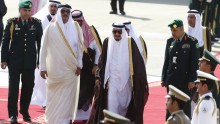The situation with Qatar is going from bad to worse. Nine countries, including Saudi Arabia, Egypt, the UAE, Bahrain, Libya, Yemen, Maldives, Mauricio, and Mauritania, recently ceased diplomatic relations with that country, mostly accusing Qatar of supporting international terrorism, specifically Al-Qaeda and the Islamic State. President Donald Trump, after a visit to Riyadh several weeks ago, believes he deserves every praise for the stoppage of diplomatic relations between Qatar and the Persian Gulf countries. Turkish President Recep Tayyip Erdogan, on the other hand, declared that his country will maintain diplomatic relations with Qatar and oppose that country’s isolation on the part of the Persian Gulf countries.
Below is an interview with Dr. Viacheslav SHVED, head of the Department of Asian and African Countries at the National Academy of Sciences’ Institute of World History. Dr. Shved was asked to comment on the Qatar crisis, the reasons behind it, and possible consequences.
QATAR DIDN’T WANT TO FOLLOW IN SAUDI ARABIA’S FOOTSTEPS
 “The differences between Qatar and Saudi Arabia date back decades and sharpened when Qatar banked on the Muslim brothers at the start of the Arab Spring. Those brothers’ intellectual and ideological potential formed in Qatar, along with Al Jazeera which lent a strong helping hand to that political force. At the time, Qatar’s political leadership was convinced that their Muslim brothers would help them get the Arab world under control – or at least become one of its leaders. Their stand coincided with that of Turkish President Recep Tayyip Erdogan who considered it to be an Arab version of his party line.
“The differences between Qatar and Saudi Arabia date back decades and sharpened when Qatar banked on the Muslim brothers at the start of the Arab Spring. Those brothers’ intellectual and ideological potential formed in Qatar, along with Al Jazeera which lent a strong helping hand to that political force. At the time, Qatar’s political leadership was convinced that their Muslim brothers would help them get the Arab world under control – or at least become one of its leaders. Their stand coincided with that of Turkish President Recep Tayyip Erdogan who considered it to be an Arab version of his party line.
“Saudi Arabia, however, was scared by the coming to power of the Muslim Brotherhood in several Arab countries, especially in Egypt. They feared that this revolutionary movement could turn into a tidal wave that would sweep under the existing monarchy. The trouble was that the Muslim brothers demanded governance based on election, not on hereditary right. In other words, they were opposed to absolute monarchy.
“Saudi Arabia realized that the brothers’ leader, Mohamed Morsi, was trying to implement Iran’s theocratic regime. This was what made Riyadh get active, for fear that Morsi could make friends with Iran. They wanted to liquidate that regime. Egypt’s current President, Field Marshal Abdel Fattah el-Sisi, has spent several years in Saudi Arabia as a military attache. They know him well and after he became Egypt’s defense minister, a coup d’etat was a technical matter. Saudi Arabia, UAE, and Kuwait supported him right after the coup and gave Egypt 20 billion dollars as a gift, to help reinforce its position. Saudi Arabia is seriously concerned about Egypt after it took its stand against Qatar. It is safe to assume that Saudi Arabia and Iran’s opposition played a major role in what became known as the Qatar crisis.
“Qatar flatly refused to follow in Saudi Arabia’s footsteps and kept coming up with its own political ambitions. After the fall of the Morsi regime, two political camps materialized in the Middle East as earnest opponents: Qatar plus Turkey plus Muslim Brotherhood, on the one hand, and Saudi Arabia and the Gulf Cooperation Council, on the other hand. Their struggle took place in Syria where a civil war broke out as a revolt against the Bashar al-Assad regime. At first, Qatar played a major role in the insurgent movement, but then Saudi Arabia took over and got the Syrian insurgents under control.
“In 2014, the situation got so bad that Saudi Arabia, the UAE, and Kuwait called back their ambassadors from Doha. Several months later, talks began and Qatar stopped supporting the Muslim Brotherhood openly. Relations between the countries resumed. Qatar, however, was loath to take an anti-Iranian stand and tried to distance itself from the stand adopted by Saudi Arabia and the UAE as a vanguard anti-Iranian force. Qatar has joint interests with Iran in developing gas shelf deposits, so it tried to maneuver, and succeeded until recently.”
TRUMP STRENGTHENS STRATEGIC ALLIANCE BETWEEN THE U.S. AND SAUDI ARABIA
What about the United States and its role in dealing with the Qatar crisis, considering that President Trump has openly sided with Saudi Arabia?
“When Mr. Trump became president, Saudi Arabia had joined an anti-Iranian front with the United States. During his visit to Riyadh, Mr. Trump held constructive talks and tangibly strengthened the strategic alliance between the States and Saudi Arabia. Also, an absolutely unprecedented event took place, I mean the Arab Islamic American Summit. It was attended by the leaders of 55 out of 57 Arab countries (save for Iran and Syria) as members of the Gulf Cooperation Council. This summit served as proof of Saudi Arabia’s leading role in forming a powerful coalition meant to combat Iran even more than terrorism.
“After that, I believe, Saudi Arabia decided that no one would act contrary to their political line, what with US support. They also decided to teach Qatar a lesson, so it would forget its ambitions. I think Qatar is being whipped in public and shown its place as a Gulf Cooperation member country. All this should end by reaching a compromise, with Qatar abandoning its political ambitions and recognizing Saudi Arabia’s dominance in the Arab world.
“Mohammad bin Salman Al Saud, deputy crown prince and the world’s youngest defense minister of Saudi Arabia, visited Moscow recently. He is generally regarded as a rising star on the Arab political horizon and as the future king of Saudi Arabia. He flew to Moscow to see whether Russia would respond to Saudi Arabia’s effort to help it out of the cul-de-sac in Syria.
“Generally speaking, Saudi Arabia’s key target is to isolate Iran and prevent it from playing a major role in the Middle East and Islamic world. Hence its tough stand with regard to Qatar, using force where diplomatic means fail. King Salman’s planned visit to Moscow will most likely be aimed at making a deal.
“As for the UAE’s ban on voicing support for Qatar, I guess it’s a series of measures being taken in order to form a certain public opinion, that no further flirting between Qatar and Iran will be allowed.”
German Foreign Minister Sigmar Gabriel recently declared: “Apparently, Qatar is to be isolated more or less completely and hit existentially. Such a ‘Trumpification’ of relations in a region already susceptible to crises is particularly dangerous.”
“Germany sees that Donald Trump is openly trying to resume US role in the Middle East the way it was under George Bush, Jr. Germany is afraid that the Arab world will listen to what Donald Trump has to say in the first place, considering that the new White House resident has demonstrated that he can be a strong ally and won’t hesitate about making Iran abandon its ambitions and preventing it from carrying out its Shiite triangle or bulge plans aimed at increasing its influence in the Arab world.”
TOP PRIORITY: EXPANDING RELATIONS WITH PERSIAN GULF COUNTRIES
What lessons should Ukraine learn from the Qatar crisis?
“Fortunately or not, there is no need for Ukraine to get involved. This is what’s best described as a family squabble among the Gulf Cooperation Council countries. At the same time, this offers vast room for diplomatic maneuver. This area is being actively developed by the Gulf Cooperation Council countries and is regarded as a serious and effective integration project. These countries are showing tangible economic progress, so it is important for Ukraine to expand relations with them and hope that they will settle their disputable issues among themselves before long, that Ukraine will be able to use this alliance – Saudi Arabia in the first place – to solve its own strategic issues. The latter range from preserving the territorial integrity to getting Crimea back, to upgrading the national economy, to making the average Ukrainian live a happier daily life. Too bad Ukraine failed to respond to Saudi Arabia’s Vision 2030, a project that provides for economic upgrading without relying on oil revenues.”








